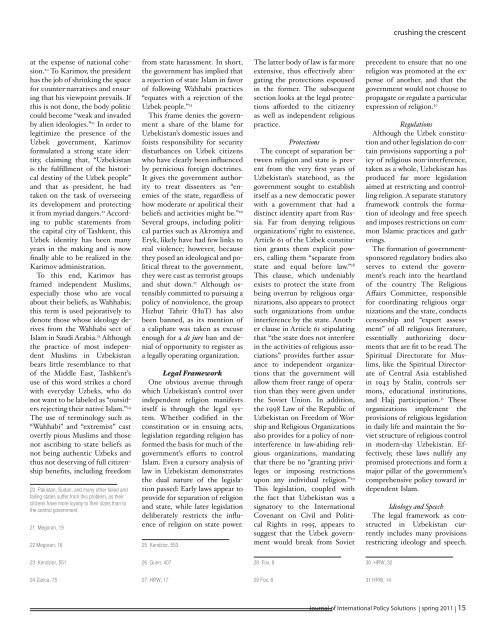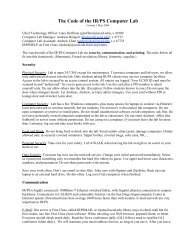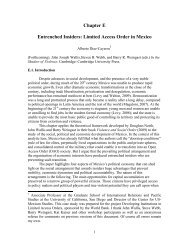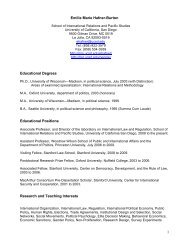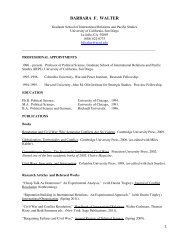to download the full journal. (1.2MB PDF) - School of International ...
to download the full journal. (1.2MB PDF) - School of International ...
to download the full journal. (1.2MB PDF) - School of International ...
Create successful ePaper yourself
Turn your PDF publications into a flip-book with our unique Google optimized e-Paper software.
crushing <strong>the</strong> crescent<br />
at <strong>the</strong> expense <strong>of</strong> national cohesion.<br />
20 To Karimov, <strong>the</strong> president<br />
has <strong>the</strong> job <strong>of</strong> shrinking <strong>the</strong> space<br />
for counter-narratives and ensuring<br />
that his viewpoint prevails. If<br />
this is not done, <strong>the</strong> body politic<br />
could become “weak and invaded<br />
by alien ideologies.” 21 In order <strong>to</strong><br />
legitimize <strong>the</strong> presence <strong>of</strong> <strong>the</strong><br />
Uzbek government, Karimov<br />
formulated a strong state identity,<br />
claiming that, “Uzbekistan<br />
is <strong>the</strong> fulfillment <strong>of</strong> <strong>the</strong> his<strong>to</strong>rical<br />
destiny <strong>of</strong> <strong>the</strong> Uzbek people”<br />
and that as president, he had<br />
taken on <strong>the</strong> task <strong>of</strong> overseeing<br />
its development and protecting<br />
it from myriad dangers. 22 According<br />
<strong>to</strong> public statements from<br />
<strong>the</strong> capital city <strong>of</strong> Tashkent, this<br />
Uzbek identity has been many<br />
years in <strong>the</strong> making and is now<br />
finally able <strong>to</strong> be realized in <strong>the</strong><br />
Karimov administration.<br />
To this end, Karimov has<br />
framed independent Muslims,<br />
especially those who are vocal<br />
about <strong>the</strong>ir beliefs, as Wahhabis;<br />
this term is used pejoratively <strong>to</strong><br />
denote those whose ideology derives<br />
from <strong>the</strong> Wahhabi sect <strong>of</strong><br />
Islam in Saudi Arabia. 23 Although<br />
<strong>the</strong> practice <strong>of</strong> most independent<br />
Muslims in Uzbekistan<br />
bears little resemblance <strong>to</strong> that<br />
<strong>of</strong> <strong>the</strong> Middle East, Tashkent’s<br />
use <strong>of</strong> this word strikes a chord<br />
with everyday Uzbeks, who do<br />
not want <strong>to</strong> be labeled as “outsiders<br />
rejecting <strong>the</strong>ir native Islam.” 24<br />
The use <strong>of</strong> terminology such as<br />
“Wahhabi” and “extremist” cast<br />
overtly pious Muslims and those<br />
not ascribing <strong>to</strong> state beliefs as<br />
not being au<strong>the</strong>ntic Uzbeks and<br />
thus not deserving <strong>of</strong> <strong>full</strong> citizenship<br />
benefits, including freedom<br />
20 Pakistan, Sudan, and many o<strong>the</strong>r failed and<br />
failing states suffer from this problem, as <strong>the</strong>ir<br />
citizens have more loyalty <strong>to</strong> <strong>the</strong>ir clans than <strong>to</strong><br />
<strong>the</strong> central government.<br />
21 Megoran, 19<br />
22 Megoran, 16<br />
from state harassment. In short,<br />
<strong>the</strong> government has implied that<br />
a rejection <strong>of</strong> state Islam in favor<br />
<strong>of</strong> following Wahhabi practices<br />
“equates with a rejection <strong>of</strong> <strong>the</strong><br />
Uzbek people.” 25<br />
This frame denies <strong>the</strong> government<br />
a share <strong>of</strong> <strong>the</strong> blame for<br />
Uzbekistan’s domestic issues and<br />
foists responsibility for security<br />
disturbances on Uzbek citizens<br />
who have clearly been influenced<br />
by pernicious foreign doctrines.<br />
It gives <strong>the</strong> government authority<br />
<strong>to</strong> treat dissenters as “enemies<br />
<strong>of</strong> <strong>the</strong> state, regardless <strong>of</strong><br />
how moderate or apolitical <strong>the</strong>ir<br />
beliefs and activities might be.” 26<br />
Several groups, including political<br />
parties such as Akromiya and<br />
Eryk, likely have had few links <strong>to</strong><br />
real violence; however, because<br />
<strong>the</strong>y posed an ideological and political<br />
threat <strong>to</strong> <strong>the</strong> government,<br />
<strong>the</strong>y were cast as terrorist groups<br />
and shut down. 27 Although ostensibly<br />
committed <strong>to</strong> pursuing a<br />
policy <strong>of</strong> nonviolence, <strong>the</strong> group<br />
Hizbut Tahrir (HuT) has also<br />
been banned, as its mention <strong>of</strong><br />
a caliphate was taken as excuse<br />
enough for a de jure ban and denial<br />
<strong>of</strong> opportunity <strong>to</strong> register as<br />
a legally operating organization.<br />
Legal Framework<br />
One obvious avenue through<br />
which Uzbekistan’s control over<br />
independent religion manifests<br />
itself is through <strong>the</strong> legal system.<br />
Whe<strong>the</strong>r codified in <strong>the</strong><br />
constitution or in ensuing acts,<br />
legislation regarding religion has<br />
formed <strong>the</strong> basis for much <strong>of</strong> <strong>the</strong><br />
government’s efforts <strong>to</strong> control<br />
Islam. Even a cursory analysis <strong>of</strong><br />
law in Uzbekistan demonstrates<br />
<strong>the</strong> dual nature <strong>of</strong> <strong>the</strong> legislation<br />
passed: Early laws appear <strong>to</strong><br />
provide for separation <strong>of</strong> religion<br />
and state, while later legislation<br />
deliberately restricts <strong>the</strong> influence<br />
<strong>of</strong> religion on state power.<br />
25 Kendzior, 553<br />
The latter body <strong>of</strong> law is far more<br />
extensive, thus effectively abrogating<br />
<strong>the</strong> protections espoused<br />
in <strong>the</strong> former. The subsequent<br />
section looks at <strong>the</strong> legal protections<br />
afforded <strong>to</strong> <strong>the</strong> citizenry<br />
as well as independent religious<br />
practice.<br />
Protections<br />
The concept <strong>of</strong> separation between<br />
religion and state is present<br />
from <strong>the</strong> very first years <strong>of</strong><br />
Uzbekistan’s statehood, as <strong>the</strong><br />
government sought <strong>to</strong> establish<br />
itself as a new democratic power<br />
with a government that had a<br />
distinct identity apart from Russia.<br />
Far from denying religious<br />
organizations’ right <strong>to</strong> existence,<br />
Article 61 <strong>of</strong> <strong>the</strong> Uzbek constitution<br />
grants <strong>the</strong>m explicit powers,<br />
calling <strong>the</strong>m “separate from<br />
state and equal before law.” 28<br />
This clause, which undeniably<br />
exists <strong>to</strong> protect <strong>the</strong> state from<br />
being overrun by religious organizations,<br />
also appears <strong>to</strong> protect<br />
such organizations from undue<br />
interference by <strong>the</strong> state. Ano<strong>the</strong>r<br />
clause in Article 61 stipulating<br />
that “<strong>the</strong> state does not interfere<br />
in <strong>the</strong> activities <strong>of</strong> religious associations”<br />
provides fur<strong>the</strong>r assurance<br />
<strong>to</strong> independent organizations<br />
that <strong>the</strong> government will<br />
allow <strong>the</strong>m freer range <strong>of</strong> operation<br />
than <strong>the</strong>y were given under<br />
<strong>the</strong> Soviet Union. In addition,<br />
<strong>the</strong> 1998 Law <strong>of</strong> <strong>the</strong> Republic <strong>of</strong><br />
Uzbekistan on Freedom <strong>of</strong> Worship<br />
and Religious Organizations<br />
also provides for a policy <strong>of</strong> noninterference<br />
in law-abiding religious<br />
organizations, mandating<br />
that <strong>the</strong>re be no “granting privileges<br />
or imposing restrictions<br />
upon any individual religion.” 29<br />
This legislation, coupled with<br />
<strong>the</strong> fact that Uzbekistan was a<br />
signa<strong>to</strong>ry <strong>to</strong> <strong>the</strong> <strong>International</strong><br />
Covenant on Civil and Political<br />
Rights in 1995, appears <strong>to</strong><br />
suggest that <strong>the</strong> Uzbek government<br />
would break from Soviet<br />
precedent <strong>to</strong> ensure that no one<br />
religion was promoted at <strong>the</strong> expense<br />
<strong>of</strong> ano<strong>the</strong>r, and that <strong>the</strong><br />
government would not choose <strong>to</strong><br />
propagate or regulate a particular<br />
expression <strong>of</strong> religion. 30<br />
Regulations<br />
Although <strong>the</strong> Uzbek constitution<br />
and o<strong>the</strong>r legislation do contain<br />
provisions supporting a policy<br />
<strong>of</strong> religious non-interference,<br />
taken as a whole, Uzbekistan has<br />
produced far more legislation<br />
aimed at restricting and controlling<br />
religion. A separate statu<strong>to</strong>ry<br />
framework controls <strong>the</strong> formation<br />
<strong>of</strong> ideology and free speech<br />
and imposes restrictions on common<br />
Islamic practices and ga<strong>the</strong>rings.<br />
The formation <strong>of</strong> governmentsponsored<br />
regula<strong>to</strong>ry bodies also<br />
serves <strong>to</strong> extend <strong>the</strong> government’s<br />
reach in<strong>to</strong> <strong>the</strong> heartland<br />
<strong>of</strong> <strong>the</strong> country. The Religious<br />
Affairs Committee, responsible<br />
for coordinating religious organizations<br />
and <strong>the</strong> state, conducts<br />
censorship and “expert assessment”<br />
<strong>of</strong> all religious literature,<br />
essentially authorizing documents<br />
that are fit <strong>to</strong> be read. The<br />
Spiritual Direc<strong>to</strong>rate for Muslims,<br />
like <strong>the</strong> Spiritual Direc<strong>to</strong>rate<br />
<strong>of</strong> Central Asia established<br />
in 1943 by Stalin, controls sermons,<br />
educational institutions,<br />
and Hajj participation. 31 These<br />
organizations implement <strong>the</strong><br />
provisions <strong>of</strong> religious legislation<br />
in daily life and maintain <strong>the</strong> Soviet<br />
structure <strong>of</strong> religious control<br />
in modern-day Uzbekistan. Effectively,<br />
<strong>the</strong>se laws nullify any<br />
promised protections and form a<br />
major pillar <strong>of</strong> <strong>the</strong> government’s<br />
comprehensive policy <strong>to</strong>ward independent<br />
Islam.<br />
Ideology and Speech<br />
The legal framework as constructed<br />
in Uzbekistan currently<br />
includes many provisions<br />
restricting ideology and speech.<br />
23 Kendzior, 551<br />
26 Gunn, 407<br />
28 Fox, 8<br />
30 HRW, 32<br />
24 Zanca, 75<br />
27 HRW, 17<br />
29 Fox, 8<br />
31 HRW, 14<br />
Journal <strong>of</strong> <strong>International</strong> Policy Solutions | spring 2011 | 15


